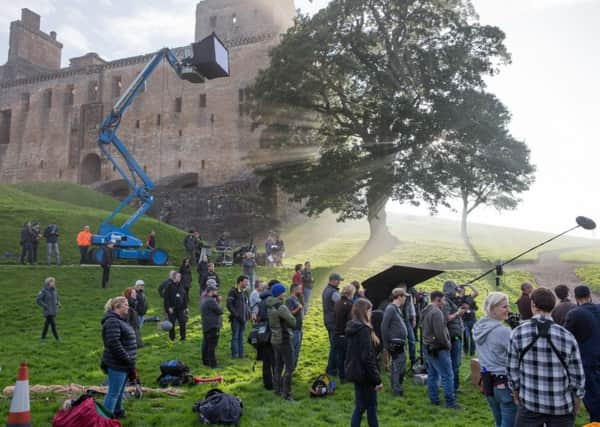Time running out to build studio to exploit Outlander effect, warns Scots film producer


Glasgow-born Iain Smith, whose credits include The Fifth Element, Children of Men, Seven Years In Tibet and Cold Mountain, said his home country was missing out on a huge UK industry boom from streaming services like Netflix.
Smith, chair of the British Film Commission, said the government had failed to build on the success of attracting the Sony-Starz series Outlander and warned that developments in CGI meant Scotland could no longer rely on being used for location filming.
Advertisement
Hide AdAdvertisement
Hide AdScottish film-makers have been lobbying for decades for the country to have a full-time studio to attract blockbuster film productions and high-quality drama series.
The Scottish Government set up a “film studio delivery group” in May 2013, before production began on Outlander in a converted warehouse in Cumbernauld, in Lanarkshire. Culture secretary Fiona Hyslop said at the time: “There is clearly an appetite for a large-scale film studio in Scotland, particularly for one with an effective sound stage facility.”
Outlander has been credited with more than doubling the value of the industry to £95 million since then, along with films like Avengers: Infinity War, Outlaw King and Mary Queen Of Scots.
A Holyrood inquiry into the state of the screen sector in Scotland, which reported in June 2018, warned that there was an “urgent need to deliver new infrastructure – not just plans for new infrastructure” within six months.
By the end of the year a new Screen Scotland agency was up and running and had announced that a former wave power plant in Leith Docks was the preferred site for a permanent studio and that it had to have an operator in place by the spring.
When the deadline passed, Screen Scotland insisted it was in “advanced negotiations” with a preferred bidder and was planning to open the studio by the end of 2019. But there have been no further updates since the end of April, other than to drop the pledge it would be operational this year.
Smith said: “I work at a UK level and if you look at how much inward investment is coming into the industry we’re talking about several billions every year.
Advertisement
Hide AdAdvertisement
Hide Ad“I understand a studio has to be relatively down the list of priorities compared to housing, education and so on.
“But at the same time our world and our nationhood is defined by the presence that we have in the international content business.
“There were warnings quite a few years ago about the need to build proper shooting spaces in Scotland.
“Scotland could be making tens of millions of pounds that it is not making at the moment. Streaming services like Netflix are lining up to land their jumbo jets to land on our airstrips in Britain.” Smith added: “The filming of Outlander in Cumbernauld has proved that there is business there. You’d have thought would have spurred the government into action. It needs to look much more seriously and more purposefully at the issue of shooting space that is fit for purpose.
“If you only get productions that are coming to Scotland to shoot in a fishing village or a Highland glen you’re not going to get very much. You need to have a shooting space and then people will start to marry up a complete production schedule. Scotland has become a location base rather than a shooting base.
“It doesn’t have to be huge or Hollywood or anything like that. But it needs to give all the young talent that is coming through some kind of avenue other than a taxi to the airport. We have to be very careful about relying on locations in Scotland now, with the developments in CGI and other visual effects.”
A spokeswoman for Screen Scotland said: “We are completing due diligence on the necessary technical and legal processes and will have more to say shortly. We’re unable to say anything further at this stage due to commercial confidentiality.”